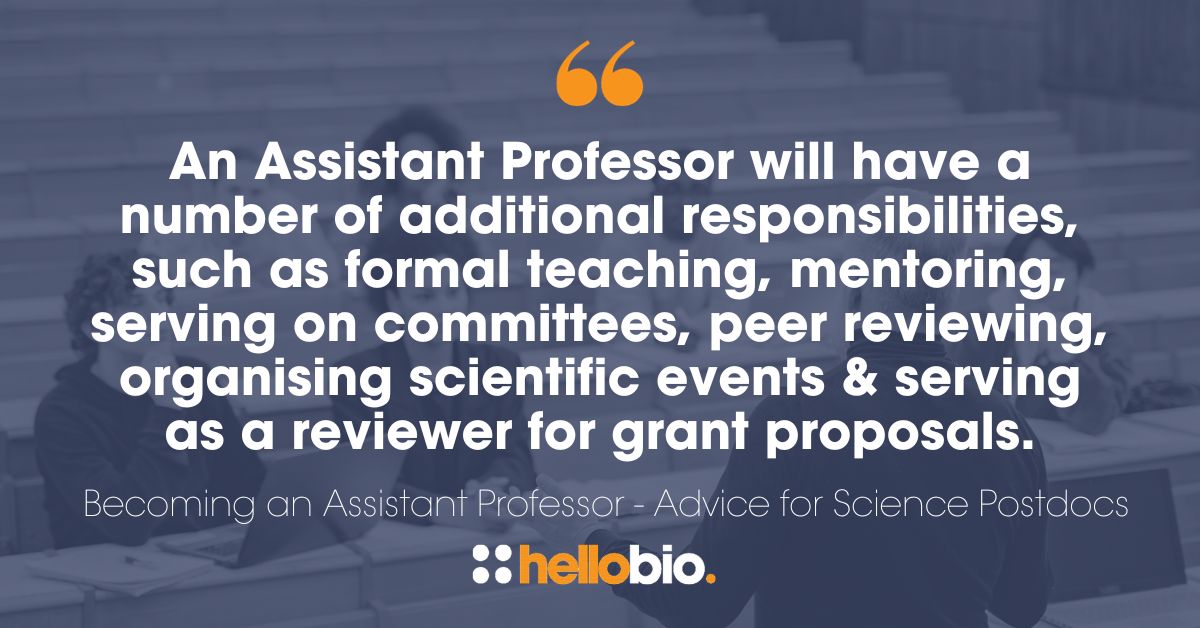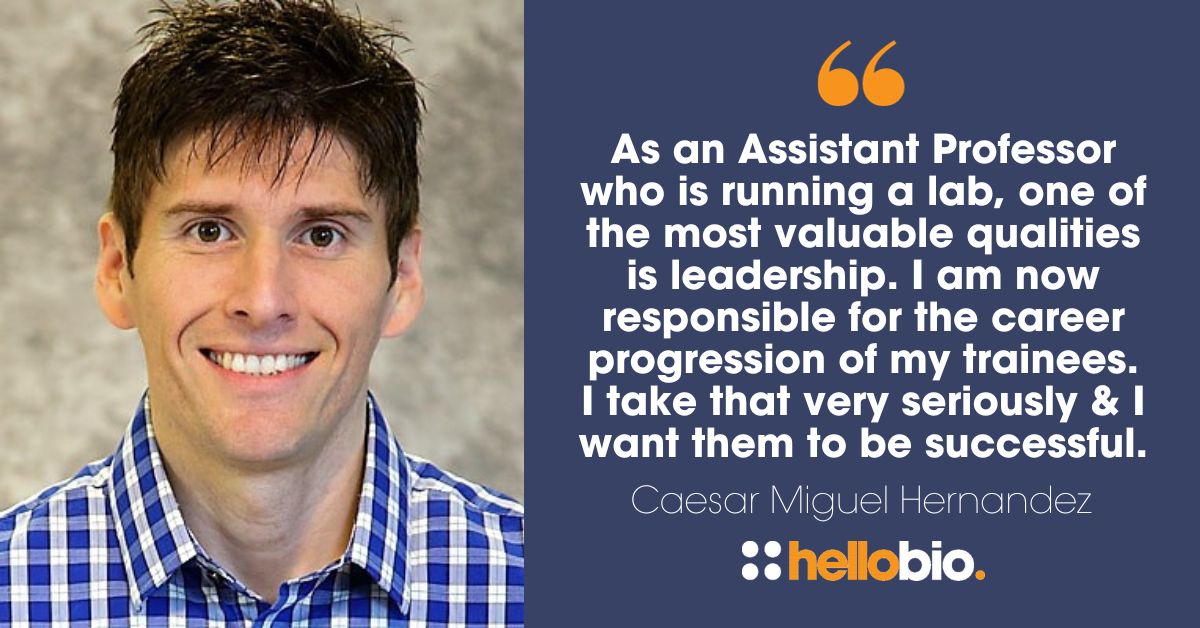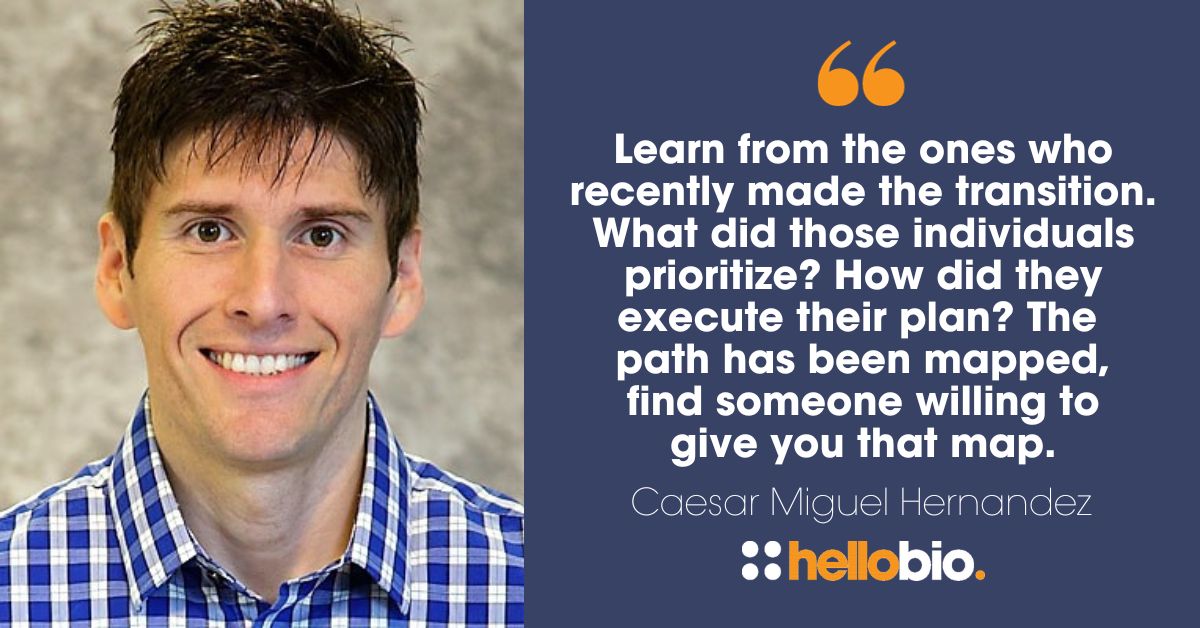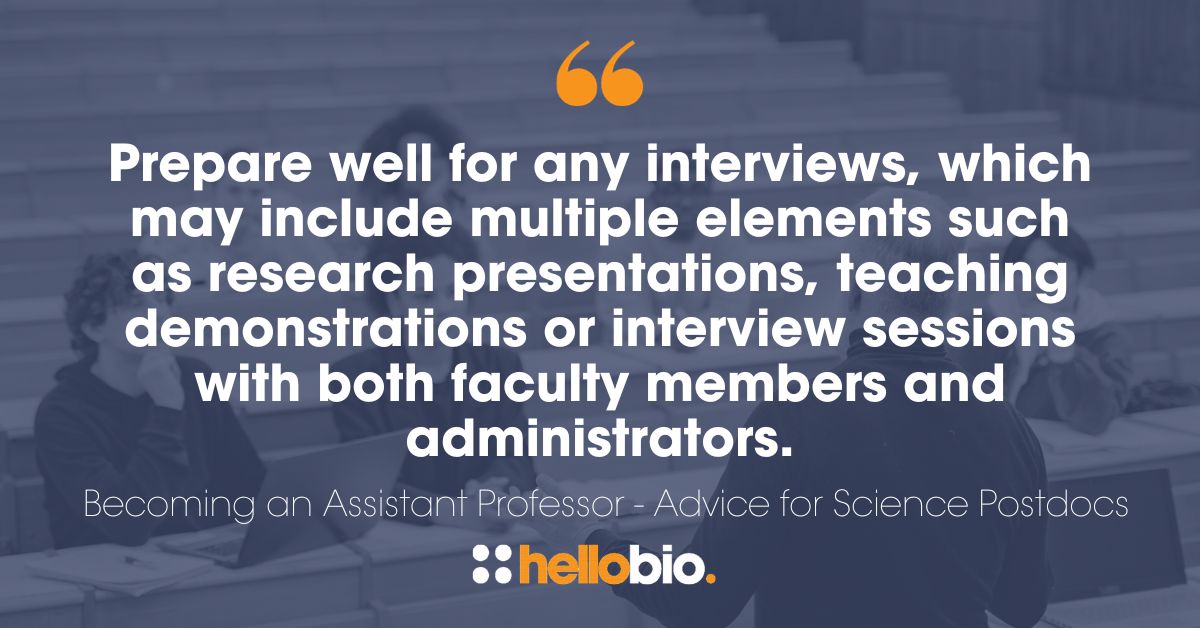Becoming an Assistant Professor - Advice for Science Postdocs
For life scientists hoping to follow a traditional academic career path, the next step beyond a postdoc role is to become an Assistant Professor. While both roles require the demonstration of extensive research skills and experience, an Assistant Professor will have a number of additional responsibilities, such as formal teaching, mentoring, serving on committees, peer reviewing, organising scientific events, or serving as a reviewer for grant proposals.
They will need to have a balanced focus on research, teaching, and service, and will be expected to establish an independent research program, secure their own funding, and be published in high-impact journals. They will also be expected to carry out formal teaching, which may include both undergraduate and graduate courses. An Assistant Professor will be working towards establishing themselves as a leading researcher in their field, and a successful tenure application is seen as a critical milestone in any scientist’s career.
If you’re keen to take that next step, it’s essential you invest time in gaining plenty of teaching experience, working on your career development, and collaborating with others. In this article we share advice on the actions you should be taking to enhance your chances of being promoted from postdoc to Assistant Professor. We also speak to Caesar Miguel Hernandez of the University of Alabama at Birmingham, USA, who recently took that next step and has generously shared his thoughts and advice for those hoping to follow in his footsteps!
Enhancing your chances
So you’ve gained your PhD, put in several years of intensive research as a postdoc, and you’re ready to apply for a tenure-track position as an Assistant Professor! Here are some actions you can start to take to help increase your chances of success:
Research productivity
- Publish papers - You’ll already have experience of this, but publishing your research in respected scientific journals is essential if you want to become an Assistant Professor. Try to submit your work to a wider variety of publications, and aim for high-quality, peer-reviewed outlets in order to demonstrate the level of your expertise.
- Secure research grants - Apply for funding grants whenever and wherever possible. As well as providing financial support for your research, successful grant applications will serve as an indicator of your ability to secure external funding.
- Present at conferences - Be sure to accept any opportunities to speak or present at science conferences. These events are essential for gaining visibility as a leading researcher in your field, and for establishing professional contacts.
- Keep up-to-date - Stay updated with the latest cutting-edge research developments in your field by reading, learning, and attending online events or courses.
Teaching & Mentoring
- Become a teaching assistant - You’ll probably already have some form of teaching experience as a postdoc, but look for further opportunities wherever you can. A teaching assistant role can offer valuable additional hours in a classroom setting which will boost your teaching CV.
- Create your own courses - Consider writing, developing, and teaching your own science courses. Demonstrating your ability to design and deliver teaching material effectively will stand you in good stead for potential faculty positions.
- Mentoring - This is also likely to be something you have experience of, but the more mentoring experience you can gain, the better your chances of promotion. You’ll need to be able to demonstrate that you are able to guide and support the next generation of scientists.
Networking & Collaboration
- Focused networking - Continue to develop your professional network while focusing on nurturing relationships with those who might be able to support you with your tenure-track application. Make connections with prominent researchers, and request letters of recommendation from your postdoc advisor and other senior colleagues who can endorse your abilities, work ethic, and potential as a faculty member.
- Interdisciplinary collaboration - Collaborate with other researchers both within and outside your institution. Where possible, try to collaborate with researchers from other disciplines, as interdisciplinary research is often valued highly in academia.
Advice for success
Caesar Miguel Hernandez was recently promoted to the position of Assistant Professor at the University of Alabama at Birmingham, USA. Caesar is a neuroscience researcher whose PhD research focused on the neural mechanisms of altered decision making and impaired executive function. We asked him some questions about his new role, his career trajectory, the challenges he has faced along the way, and his advice for other postdocs looking to apply for a tenure-track position:
Have you always wanted to work in science?
No, not at all. I never even knew science could be a career until I was a 23-24-year-old undergraduate in Biology at Palm Beach Community College. In fact, I didn’t attend college until after a 4-year period of service in the United States Marine Corps.
When did you decide on a long-term plan for a tenure-track career?
I didn’t begin thinking about a long-term career in science until I was a senior undergraduate. Even after my master’s program and into my PhD, it took me some time to finally decide I wanted to open my own lab. It was maybe around my 3rd year in my PhD program. I had fantastic mentors that helped me see a path forward.
What steps did you take to prepare yourself for a role as an Assistant Professor?
As a PhD student, I took every single opportunity for scientific growth and progression presented to me. I did this despite feeling overloaded, but it was a worthwhile trade off.
What challenges did you face and how did you overcome them?
The experimental challenges I faced along the way required me to think carefully about solutions. I think all the wonderful mentors that I had along the way provided the support I needed to overcome career challenges, as it can be difficult for me sometimes to identify when I need to adapt. The biggest challenges occurred during the height of the COVID-19 pandemic when my postdoc lab shut down, and just a couple of months later, I became a first-time father. It required a great deal of coordination between me and my wife (who was also a postdoc) to keep our careers from a precipitous decline. My wife helped me through it all, and I hope I was just as helpful to her.
How does your new role differ from your previous postdoc position?
The major difference for me is that I am now responsible for the career progression of my trainees. I take that very seriously, and I want them to be successful, so I ensure I am checking in accordingly and meeting their needs as best I can.
What are the most important qualities an Assistant Professor should have?
I think as an Assistant Professor who is running a lab, one of the most valuable qualities is leadership. I was all of a sudden responsible for the well-being and career progression of individuals, and I wanted to make sure I got it right.
What excites you most about your new role, and what challenges do you anticipate you might face?
What excites me is the nearly limitless possibilities and direction my research program can take. Usually, not knowing the future is frightening. However, not knowing where my research may take us can be exhilarating. I want to tackle the neural circuitry underlying what links neuropsychiatric disorder and trajectories of aging. I anticipate it will be highly challenging to get my lab up to 100% efficiency in a relatively short period of time. This includes budgeting, purchasing, and set-up.
What advice would you give to a postdoc hoping to become an Assistant Professor?
Learn from the ones who recently made the transition. What did those individuals prioritize? How did they execute their plan? The path has been mapped, find someone willing to give you that map.
What are your career goals beyond Assistant Professor?
The most obvious goal for me is to continue my career towards becoming a full professor and remain an independent scientist, but I do hope that my research can be of service to humanity in some way or another. I would like to have significantly contributed to our understanding of the interplay between multiple disease states across the lifespan and the underlying neural function changes. I also would like to take up higher leadership roles at university level so that I can push for positive top down changes that address inequities in science and academia. I would be happy if, when all was said and done, I helped at least one individual overcome the type of obstacles I may have faced to have a successful career and a well-balanced life.
Preparing your application
Once you feel ready to begin submitting applications, there are a few more things to remember if you want to give yourself the best chance of success:
Submitting applications
- Apply widely - Consider applying for multiple tenure-track positions rather than focusing in on one specific institution or role. Apply to institutions that align with your research interests and teaching expertise.
- Tailor your approach - Make sure you tailor your application to fit the requirements and expectations of the institute you are applying to. Be sure to highlight how your experience and goals align with their mission.
Interview preparation
- Be prepared - Prepare well for any interviews, which may include multiple elements such as research presentations, teaching demonstrations, and interview sessions with both faculty members and administrators.
- Seek advice from mentors - Approach your mentors and other senior faculty members for advice and guidance. Those who have been through the process before will be best placed to offer the most valuable insights and support as you navigate the final stages of your transition from postdoc to Assistant Professor!
--------------
More support for postdocs from Hello Bio
If you’re a life science postdoc, or hoping to becoming one, why not take a look at some of these excellent resources available now on the Hello Bio blog:
- Support Pack for Postdocs - a collection of postdoc support resources
- Navigating the PhD to Postdoc Transition - guest blog by Dr Heema Vyas
- The Importance of Mentoring for Postdoctoral Fellows - guest blog by Ksenia Kastanenka
- The Life Scientists’ Guide to Applying for Postdocs - advice from fellow scientists
___________________________________________
If you enjoyed this article, why not check out the other resources available on our blog. We are passionate about supporting life scientists including early career life scientists and PhD students - with really low-priced reagents, antibodies and biochemicals, early career scientist grants, and resources to help with both personal and professional development. We know how tough it is - so we hope you find these helpful!
More General Support for Life Scientists
For advice on wellbeing, dissertations, presenting at conferences, wellbeing, PhD support, networking and lots more, we have a huge range of articles to help - just click below:
Save up to 50% on our high purity reagents...
When you get to the stage of planning your experiments, don't forget that we offer a range of low-cost, high-purity agonists, antagonists, inhibitors, activators, antibodies and fluorescent tools (yes - they really are around half the price of other suppliers!) You can use our Quick Multi-Search Tool to search for lots of products in one go, and the range includes:
- Enzyme inhibitors and activators
- Chemogenetic ligands
- Ion channel modulators
- GPCR & ionotropic receptor ligands
- Cell biology reagents & biochemicals
Technical resources
Try our Molarity Calculator: a quick and easy way to calculate the mass, volume or concentration required for making a solution.
Try our Dilution Calculator: an easy way to work out how to dilute stock solutions of known concentrations
We also offer a comprehensive range of technical resources including antibody protocols and methods, product guides and mini-reviews:
And finally, don't forget to check back in with our blog regularly for our latest articles. If there’s something you’d love to contribute to the community, whether that’s an interview or article, drop us a line at hello@hellobio.com
























